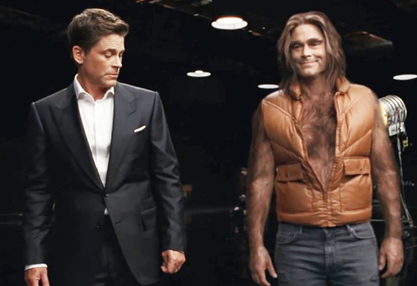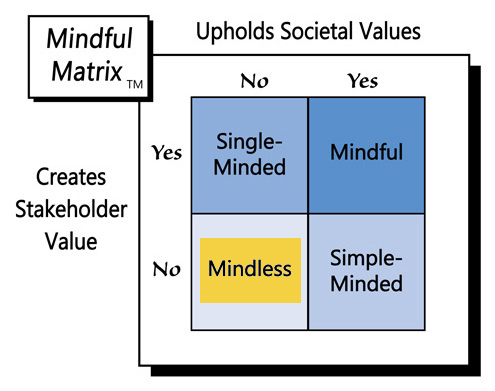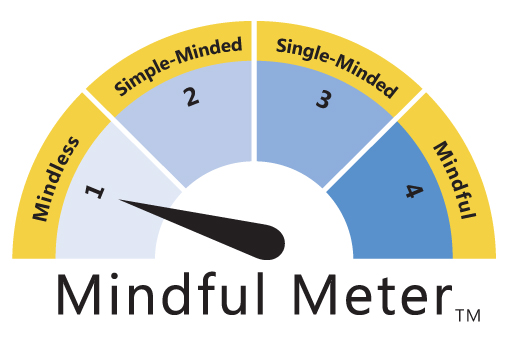The reason DirecTV closed the campaign is somewhat debatable. What’s even more surprising, however, is that in creating the campaign the company ignored a whole set of socially objectionable outcomes.
First, though, for those who missed the ads, here’s a general summary of the dialogue between regular Rob Lowe (+) and his uncool counterpart (-).
“Hi, I’m Rob Lowe, and I have DirecTV.” (Rob +)
“I’m [some unappealing characteristic] Rob Lowe, and I have cable.” (Rob -)
“DirecTV [is great because . . .]" (Rob +)
“Cable [is terrible because . . .]" (Rob -)
“Don’t be like be like this [unappealing characteristic] me. Get DirecTV.” (Rob +)
Over the course of a few months, DirecTV aired ten different versions of the ad, featuring the following Rob Lowe personas: Painfully Awkward Rob Lowe, Creepy Rob Lowe, Total Deadbeat Rob Lowe, Peaked in High School Rob Lowe, Poor Decision Making Rob Lowe, Overly Paranoid Rob Lowe, Scrawny Arms Rob Lowe, Meathead Rob Lowe, Crazy Hairy Rob Lowe, and Fair-Less Attractive Rob Lowe.
No commercial campaign lasts forever, so maybe the Rob Lowe ads had simply run their useful life. DirecTV claims that it intended to end the ads after the first quarter of 2015, then replace them with a new campaign featuring Hannah Davis and a talking horse. There’s compelling evidence, however, that DirecTV pulled the ads, not because of consumer fatigue (the campaign was still very popular) but because of a complaint from a competitor.
Cable giant Comcast filed a complaint about some of the ads’ specific claims, for instance, that DirecTV had “better signal reliability” and “shorter customer wait times” than cable. The National Advertising Division of Better Business Bureau judged these claims to be “unsupported” and recommended that DirecTV refrain from using them.
DirecTV’s decision to stop running the Rob Lowe ads was the right response; however, the unsubstantiated claims were not the campaign’s only flaw. The ads harbored another precarious practice that our society increasingly scorns, but for some reason it overlooked in these ads: shaming.
Shaming is “a technique used by abusive people to divert attention away from their own behavior and issues by putting pressure on a victim so they can maintain control.” It’s important to note that not all criticism constitutes shaming. While it may be appropriate to call-out someone for doing something bad, it’s not okay to label the person as bad.
“Blaming someone tells you that you did something bad, in shaming someone tells you that you are something bad.” Unfortunately, what’s become particularly prevalent is shaming people about their bodies, which is one of the “things of which we should be unashamed.”
Were all the Rob Lowe ads guilty of shaming in this sense? Probably not. Actually, a couple of the ads somewhat successfully satirized certain socially detrimental behavior, e.g., “Creepy Rob Lowe,” who went to the rec center to watch people swim and who enjoyed smelling strangers’ hair.
However, many of the ads picked on people for physical characteristics that are largely out of their control, e.g., “Scrawny Arms Rob Lowe, Crazy Hairy Rob Lowe, and Fair-Less Attractive Rob Lowe.” Yes, the ads were over-the-top exaggerations, which made them funny. However, their reproach also was not that far removed from the realities that many people face with their physiques, through no fault of their own and even after their best efforts to change their appearance.
Unfortunately it’s okay to ridicule people who are abnormally skinny or excessively hairy. How would people perceive ads, however, with less politically correct targets? Would individuals tolerate mockery of a “Full-Figured Rob Lowe” or a “Dark-Skinned Rob Lowe.” Hopefully not. The point is that these “protected” physical traits are not that different than the ones the ad campaign criticized. A blurry line separates acceptable and intolerable lampooning of personal characteristics.
No one deserves to be shamed for who they are or criticized for characteristics they can’t really change. In fact, Disney’s animated classic the Hunchback of Notre Dame taught what our society really needs: people who will do the exact opposite of shaming and instead embrace the “outcast.”
CBS called DirecTV’s campaign with Rob Lowe “entertaining and effective.” In light of the ads’ unsubstantiated claims, however, it’s unclear whether the ads really delivered enough motivation to move consumers from attention and interest to desire and action. So, if the campaign didn’t create significant stakeholder value, but it compromised society values through deception and shaming, DirecTV’s Rob Lowe campaign can be considered a case of “Mindless Marketing.”
Learn more about the Mindful Matrix and Mindful Meter.
Check out Mindful Marketing Ads and Vote your Mind!




 RSS Feed
RSS Feed